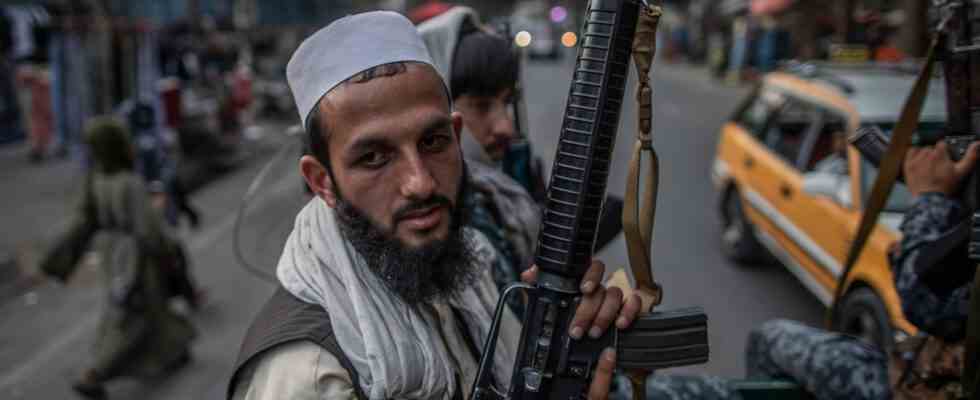Exclusive
Status: 05/23/2022 7:18 p.m
After the Taliban took power in Afghanistan, Western security authorities feared that the country could once again become a safe haven for international terrorists. Did that come true?
A man in a camouflage jacket walks through a homestead in Afghanistan. He filmed the scene himself with a cell phone camera. He is apparently a Taliban sympathizer and he speaks German. Most recently, the man is said to have lived in Hamburg, his family probably comes from Afghanistan.
Graves can be seen in the video he published on social networks in August last year. So far, the Americans have had everything under control here. “But now our cemeteries are free again! Insured with Allah’s power!” says the man. “The Talibs have taken over everything! Everything back in our hands!”
Throwback to the 1990s?
After withdrawing to NATO troops last year, the Taliban took back power in Afghanistan. They set up an “Islamic Emirate”, introduced Islamic Sharia law and, above all, massively restricted women’s rights. Large sections of the population are starving. Many people left the country, they don’t want to live under the rule of the Islamist fundamentalists. Others, especially local staff from Western organizations, still fear for their lives.
The security authorities were concerned that Afghanistan could again become a haven for international terrorists, a playground for jihadists from all over the world – as in the 1990s, when the terrorist network al-Qaeda in the Hindu Kush under the auspices of the Taliban was able to act and planned the attacks of September 11, 2001.
Virtually no Islamists who have left the country
In fact, nine months after the Taliban took power, Afghanistan has not yet attracted any significant numbers of foreign Islamists. German security authorities have to WDR-Information currently no evidence that people from the local Islamist spectrum have traveled there and joined the Taliban. Departures to join the Afghan branch of the terrorist network “Islamic State” (IS) have also not been registered recently.
However, according to security circles, it cannot be ruled out that Islamists with family ties to Afghanistan – like presumably the man who recorded the mobile phone video – might have left the country and been active on the side of the Taliban. Such travel movements could be registered, but the travel intentions are often unclear.
The Taliban are apparently keeping their promises
In the course of the peace negotiations between the USA and the Taliban, it was agreed that the Taliban should pledge that they would no longer harbor international terrorists such as those of al-Qaeda. The Taliban had announced that they would not tolerate foreign jihadists in their own ranks. So far, it seems, the new rulers in Kabul are apparently sticking to it.
“Al Qaeda has had some problems reconstituting itself, with the leadership and to a certain extent, I think the Taliban have kept their word not to allow al Qaeda to re-emerge,” said Scott Berrier, director of the US recently -Military intelligence agency DIA, at a hearing before lawmakers in Washington. “It’s something we’re watching very, very closely,” Berrier said, adding that it would likely be more than a year before al Qaeda would be able to launch attacks against the US. The same applies to the IS terrorists in the region.
Afghanistan under the Taliban, according to German security authorities, currently has far less appeal than the IS “terrorist caliphate” in Syria and Iraq a few years ago. At that time, around 1,000 Islamists left Germany for the war zone in the Middle East, including entire families and even underage girls. Afghanistan does not appear to be particularly attractive for German jihadists due to the tedious and long journey and the adverse living conditions on site.
The Taliban are fighting IS offshoots themselves
The fact that the Taliban are now engaged in a kind of anti-terrorist struggle could also be a reason why international jihadists have not yet flocked to the country. The Taliban are fighting the Afghan branch of the terrorist network IS, which is blamed for numerous suicide attacks. This year alone, IS terrorists are said to have carried out more than 40 attacks in Afghanistan and Pakistan, many of them against the Taliban. Both Islamist groups are enemies for ideological reasons.
When it became apparent last year that the Taliban would soon rule Afghanistan again, the German security authorities promptly made efforts to identify possible exits of known extremists into the country and, if necessary, to prevent them. For example, the Federal Police was made aware of such travelers. On the way to Afghanistan, however, only one person was stopped who is said not to have planned to join the Taliban but to fight against the Taliban.
The Office for the Protection of the Constitution observes “old cases”
The Federal Office for the Protection of the Constitution (BfV) also reviewed the “old cases” of jihadists who had traveled to the Afghan-Pakistani border region of Waziristan in recent years, particularly between 2007 and 2012. The region of the so-called tribal areas was then considered a retreat for terrorists from all over the world. German Islamists also traveled there, joining terrorist groups such as al-Qaeda and the Islamic Movement of Uzbekistan (IMU). They were trained on weapons and explosives.
Many of the jihadists who left for Waziristan returned to Germany. Others died on the ground, in US drone strikes, in skirmishes with the Pakistani army, or died as suicide bombers. Individual Islamists are said to have left the region and traveled on to Syria.
The whereabouts of only a small number of Islamists are still uncertain. In the past year, the Office for the Protection of the Constitution tried to determine where these jihadists are and whether they could possibly become active in Afghanistan after the withdrawal of Western troops. Several relatives of the Islamists who left the country years ago were then contacted by the Office for the Protection of the Constitution and asked about their whereabouts.

